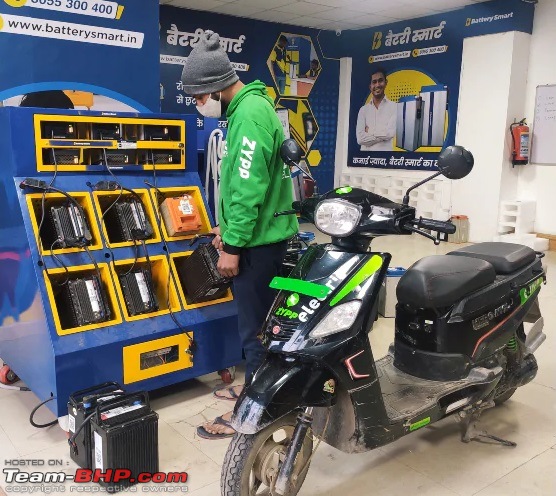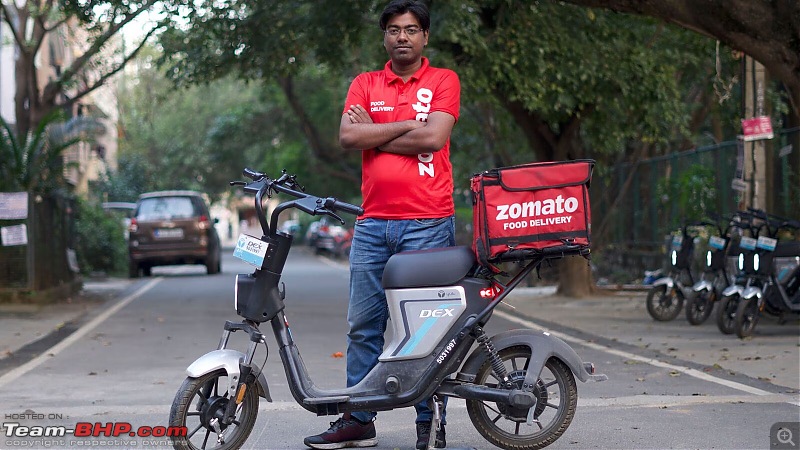Since the time EVs were introduced, the biggest drawback has been the charging time. Home charging is usually overnight for a sufficient charge and the “quickest” refill also takes roughly an hour with a DC fast charger. That’s a lot of time for charging and poses a big challenge. The solution is quite simple – swap out the battery for a new one. This is not something that just popped up in my mind right now, but something that people have been working on since the early stages of EV adoption. However, battery swapping never really took off and battery charging was given preference. Let's take a step back and look at the current scenario.
Let’s talk about the electric two-wheelers first as they make for 51.49% of the total EV sales in our country by volume. Recently there was an interesting article in '
The Ken' about how quick commerce giants like Zepto and Zomato are reviving battery swapping in India. We all know how these last-minute delivery apps have risen in India, especially in metro cities. They have multiple ‘dark stores’ and riders ready to zip through the traffic on their EVs to deliver anything you want in 10 minutes. For those who are unaware of the term, a 'dark store' or a 'ghost store' is a warehouse that's not open to the public. A dark store is not used to attract walk-in customers but solely to fulfil online orders. These dark stores or micro warehouses have cropped up everywhere and the riders are currently using EV bikes with swappable batteries.

Image source -
ETN News
Zomato recently announced that it intends to double the number of dark stores by 2025 and Zepto wants to add about 10,000 EVs to its fleet by the end of this financial year. While those are the set goals, both Zepto and Zomato have partnered with Battery Smart, a Delhi-based network of battery-swapping stations for electric vehicles. Battery Smart recently inaugurated its 1000th swap station in Delhi. The company has stations across 30 cities in regions like Haryana, NCR, Karnataka, Rajasthan, Telangana, Uttar Pradesh and Maharashtra.

Image source -
Mobility Outlook
For companies like Zomato and Zepto, the battery-swapping approach makes a lot of sense for a simple reason - the time to swap out a drained battery for a fully charged one is barely a few minutes. On the other hand, it takes roughly 4 hours for an electric scooter to charge fully on a slow charger. Less downtime is beneficial for everyone in this case. Surely other companies will start adopting this system. In metro cities, slowly and steadily, petrol bikes have been replaced by EVs for their low cost of running. Moreover, if the main issue with charging which is the downtime gets sorted with swappable battery tech, we could see it getting replaced completely at least in the commercial space.
But what about private customers? Some electric bikes are being sold to private customers with swappable batteries like – the Hero Vida 1, Bounce Infinity and Simple One. But the biggest problem here is the fact that the government has been promoting battery charging over swapping. EVs sold with batteries (charging) incur a GST of 5% while those sold without battery (swapping) attract 18% GST. Purchasing a separate Li-ion battery is also costly and taxed separately which further hikes up the price. Then there was the FAME incentive that also focused on building charging infrastructure and nothing for the swappable battery technology. Apart from this, there are some other challenges in battery swapping as well. For instance, the battery is heavy and swapping will be extremely difficult for elderly people. Battery swapping station takes up a lot of space, while an EV charger can be installed at home as well. Here’s a detailed article where Ather CEO shares why battery swapping won’t work in India (
Related article).
 Image Source
Image Source
So, will battery swapping work or not? It's still dicey as there are a few things that need to work in favour of battery swapping to become mainstream. Taxation is the primary area of concern to make the EVs more accessible. But come to think of it, the challenges can be addressed and it doesn't seem outlandish for battery swapping to work in India. Things will have to fall in place for both technologies to co-exist as that would give the customers more options and eventually better products to suit their needs.
Changing the perspective a bit, what’s the situation with 4-wheelers? If things seem uncertain with 2-wheelers, they seem impossible for 4-wheelers. There’s still a lot that needs to be worked out before battery-swapping tech is made mainstream in cars. China has had a first wave of battery swapping services and even Tesla tried out building battery swapping stations for the Model S. However, the first wave failed to make any impact. In China, however, a similar second wave seems to be coming with EV maker Nio betting big on battery-swapping tech. It has formed a partnership with brands like Geely, Changan, Jiaghuai Automobile (JAC) and Chery (
Source). They’re working on standardizing battery packs across brands to expand the battery-swapping ecosystem.

Then there's the aspect of maintaining a battery-swapping station itself. For starters, the batteries inside the swapping station are connected to the grid for charging and this needs to be monitored continuously. If the system becomes mainstream, the grid should be able to support heavy loads as well. We’re already seeing people complain about the lack of charging ports in certain areas since there are so many EVs. With a swapping station, at any given time, it should have enough fully charged batteries to service the incoming electric vehicles. If fully charged batteries aren't available, it defeats the purpose of a quick refill. The station needs a proper battery management system to monitor the battery levels.
 Image Source
Image Source
After this brief overview, let's talk about some of the positives and negatives of battery swapping. This includes both 2-wheelers and 4-wheelers, so feel free to add some more pros and cons that you can think of.
Pros of battery swapping tech
- If standardization of batteries is done, there’s a possibility that EVs can be sold without the battery. And if the cost of the battery isn’t included in the price of the EV, this would make it significantly affordable
- Faster charging times. Replacing a battery would be much quicker than charging from 0-100%
- Can carry extra batteries for added range
- Great for commercial use as the vehicle can run 24x7 with different riders/drivers. Minimal downtime
- You don’t have to worry about battery life or battery-related issues. Can just swap it out for a new one
Cons of battery swapping tech
- Setting up a battery-swapping station can be expensive. It needs plenty of batteries and manpower compared to the charging stations
- Batteries need to be handled safely and precisely for swapping. This isn't possible for everyone. 4 wheelers need extra training for professionals
- Home charging of batteries is another task as you need to carry the heavy battery to the charging point
- Private owners would refrain from sharing their batteries. They might not want a battery that has been abused for commercial use
- Currently, standardization of batteries is a big challenge in 2-wheelers and 4-wheelers. We have seen standardization in EV charging (CCS type), but not in battery swapping
What do you think? Will we see battery swapping become mainstream in India? Would you buy an EV with swappable battery?


 (16)
Thanks
(16)
Thanks

 (7)
Thanks
(7)
Thanks
 (9)
Thanks
(9)
Thanks
 (8)
Thanks
(8)
Thanks
 (1)
Thanks
(1)
Thanks
 (1)
Thanks
(1)
Thanks
 (1)
Thanks
(1)
Thanks
 (1)
Thanks
(1)
Thanks
 (2)
Thanks
(2)
Thanks
 (1)
Thanks
(1)
Thanks
 (2)
Thanks
(2)
Thanks









